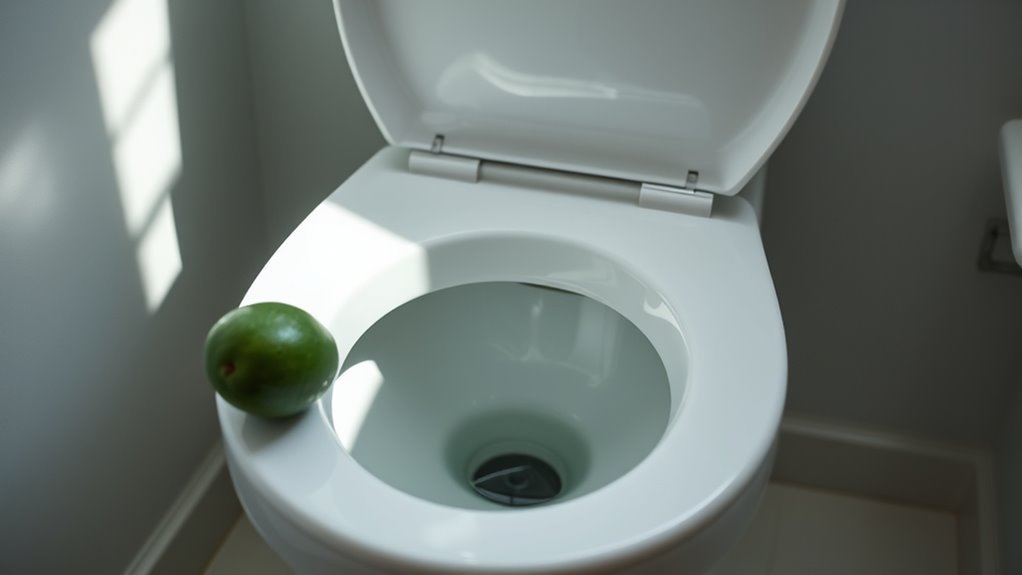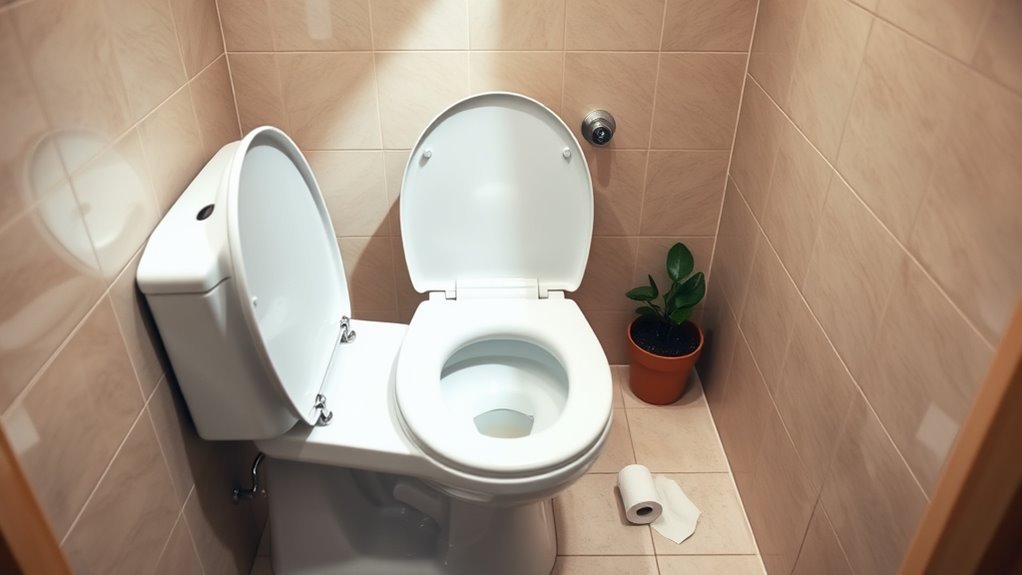Yes, the keto diet can cause diarrhea, especially during the initial shift as your body adapts to a higher fat and lower carbohydrate intake. This period, sometimes referred to as “keto flu,” may bring various digestive disturbances. To help manage these issues, consider increasing fiber intake through low-carb sources like leafy greens and avocados. Staying hydrated and gradually adjusting your fat consumption can also ease symptoms. There’s more to learn about managing digestive health on keto.
Understanding the Keto Diet

When you start a keto diet, you’re considerably reducing your carbohydrate intake while increasing fats, which can lead to a metabolic state called ketosis. This shift can be liberating, allowing your body to burn fat for energy instead of carbs. However, it’s important to address common keto misconceptions, such as the belief that all fats are good. Not all dietary fats are created equal; focus on healthy sources like avocados, nuts, and olive oil. Additionally, while some may view keto as overly restrictive, it can actually offer flexibility within those guidelines. By understanding these aspects, you can navigate the diet more effectively, maximizing benefits while minimizing potential pitfalls. Ultimately, keto can empower you to take control of your health.
Common Digestive Issues on Keto

Shifting to a keto diet can lead to various digestive issues for many people. The change to a high-fat diet often affects how your body processes food, potentially causing symptoms like diarrhea or bloating. Understanding these common issues can help you navigate your experience more smoothly.
Keto Diet Transition
As you shift to a keto diet, it’s not uncommon to encounter digestive issues that can arise during this change. The adaptation period can bring about symptoms like the “keto flu,” which may include nausea and diarrhea. Your body is adjusting to burning fat for fuel instead of carbohydrates, and this shift can disrupt your digestive system. You might also experience changes in bowel habits as your gut microbiome adapts to higher fat intake. Staying hydrated and gradually increasing fat consumption can help ease these symptoms. While these issues can be uncomfortable, they typically resolve as your body acclimates to the new diet. Understanding this process can empower you to navigate the shift with greater confidence and freedom.
High-Fat Food Effects
Adjusting to a high-fat diet can lead to various digestive issues that some individuals may experience on keto. Your body may struggle with high fat digestion initially, as it’s not used to processing large amounts of fat. This can result in symptoms like diarrhea, bloating, or gas. It’s essential to recognize that fat absorption can vary from person to person; some may adapt quickly, while others may take longer. Incorporating fats gradually and choosing easily digestible options, like avocados and olive oil, can help ease the shift. Staying hydrated and consuming adequate fiber from non-starchy vegetables may also mitigate digestive discomfort. Remember, your body’s adaptation to this new fuel source is key to enjoying the benefits of a ketogenic lifestyle.
The Role of Dietary Fiber

When following a keto diet, maintaining adequate fiber intake is essential for digestive health. You’ll want to understand the different types of dietary fiber and how they can fit into your low-carb lifestyle. Exploring fiber sources that align with keto can help prevent digestive issues, including diarrhea.
Importance of Fiber Intake
While many people focus on reducing carbohydrates in a keto diet, the importance of dietary fiber shouldn’t be overlooked. Fiber plays a significant role in digestive health and can help prevent issues like diarrhea, which some may experience on keto. Including adequate fiber sources, such as leafy greens, avocados, and nuts, can enhance your overall wellbeing. The fiber benefits include promoting regular bowel movements and supporting gut microbiota. When you prioritize fiber, you create a balanced approach that can alleviate some keto-related discomforts. Remember, even on a low-carb diet, it’s vital to guarantee you’re getting enough fiber to support your digestive system and maintain your freedom to enjoy a variety of foods. Embrace the power of fiber for a healthier, happier keto journey.
Types of Dietary Fiber
Dietary fiber comes in two main types: soluble and insoluble, each playing a unique role in digestive health. Soluble fiber dissolves in water, forming a gel-like substance that can help lower cholesterol and stabilize blood sugar levels. You can find it in foods like oats, beans, and fruits. On the other hand, insoluble fiber doesn’t dissolve in water and adds bulk to your stool, aiding in regular bowel movements. It’s found in whole grains, nuts, and vegetables. Both types are essential for a balanced diet, especially if you’re considering keto, where fiber intake might drop. Understanding these fibers can empower you to make informed food choices that support your digestive health without sacrificing freedom in your diet.
Fiber Sources in Keto
Although the keto diet is primarily known for its low carbohydrate intake, incorporating fiber-rich foods is essential for maintaining digestive health. You can enjoy a variety of keto-friendly vegetables that are low in carbs yet high in fiber. Options like spinach, kale, broccoli, and cauliflower not only provide essential nutrients but also help promote regular bowel movements. Additionally, avocados and chia seeds are excellent sources of fiber that fit perfectly into your keto meal plan. Including these fiber-rich foods can help mitigate digestive issues commonly associated with low-carb diets, such as diarrhea. By prioritizing fiber while enjoying your keto lifestyle, you’ll support your overall well-being and maintain a sense of freedom in your dietary choices.
Fat Adaptation and Its Effects
As your body shifts into a state of fat adaptation, it begins to rely more on fat for fuel instead of carbohydrates, which can lead to various physiological changes. You might experience increased metabolic efficiency, as your body learns to burn fat more effectively. This change can offer significant fat adaptation benefits, like enhanced energy levels and improved endurance. However, some individuals may also encounter digestive issues during this adjustment phase, including diarrhea. It’s essential to listen to your body and stay hydrated. Incorporating electrolytes and maintaining a balanced intake of healthy fats can help ease the change. Remember, the goal is to achieve a sustainable and enjoyable lifestyle while maximizing the benefits of fat adaptation.
Food Choices: What to Avoid
During the fat adaptation phase, making the right food choices becomes even more important to prevent unwanted digestive issues like diarrhea. You’ll want to steer clear of certain keto-friendly snacks that are high in sugar alcohols, like maltitol, which can cause gastrointestinal distress. Also, if you’re incorporating dairy alternatives, be cautious; some can be high in additives or low-quality fats that might irritate your gut. Instead, focus on whole foods like avocados, nuts, and seeds, which are less likely to upset your digestion. By being mindful of what you eat, you can enjoy the freedom of a keto lifestyle without the discomfort of digestive issues. Your choices can pave the way for a smoother shift into ketosis.
Potential Food Intolerances
When you commence on a keto diet, you might not realize that potential food intolerances could impact your digestive health. Food sensitivities can manifest in various forms, and dairy intolerance is common among those switching to high-fat dairy products. You may also experience gluten reactions if you consume gluten-containing alternatives. If you have nut allergies, be cautious with nut-based flours, as they can trigger adverse effects. Additionally, some individuals struggle with vegetable digestion, particularly when increasing fiber intake from low-carb veggies. Finally, many keto dieters use artificial sweeteners, which can irritate the gut and lead to diarrhea. By being aware of these intolerances, you can better navigate your keto journey and maintain digestive well-being.
Strategies to Reduce Diarrhea
To minimize the risk of diarrhea on a keto diet, it is essential to pay attention to your food choices and portion sizes. Here are some strategies you can implement:
- Incorporate Probiotics: Foods like yogurt and fermented vegetables can provide probiotic benefits, promoting gut health.
- Stay Hydrated: Hydration is important—ensure you drink plenty of water to help your digestive system function smoothly.
- Gradually Adjust: Shift to keto slowly to allow your body to adapt to the lower carb intake without overwhelming your system.
- Monitor Fiber Intake: Balance your fiber sources; too much can lead to digestive upset, while too little can cause constipation.
When to Seek Medical Advice
How can you tell if your digestive issues on a keto diet warrant medical attention? It’s essential to conduct a symptom assessment. If you experience persistent diarrhea for more than a few days, or if it’s accompanied by severe abdominal pain, dehydration, or blood in your stool, it’s time to consult a healthcare professional. These symptoms could indicate a more serious underlying condition that needs addressing. Additionally, if you find it hard to maintain your keto lifestyle due to these issues, a medical consultation can provide tailored advice. Remember, your health and well-being come first, and seeking help can empower you to make informed decisions about your diet and overall health. Don’t hesitate to reach out if something feels off.
Frequently Asked Questions about Keto and Diarrhea
1. Can the ketogenic diet cause diarrhea?
Yes, the ketogenic diet can cause diarrhea in some individuals, particularly during the initial transition phase. This is often due to a sudden increase in dietary fat, which can be challenging for the digestive system to adjust to. Additionally, changes in fiber intake and the consumption of sugar alcohols in keto-friendly foods can also contribute to gastrointestinal issues.
2. What are the common causes of diarrhea on a keto diet?
Common causes of diarrhea on a keto diet include an increase in dietary fat, which can overwhelm the digestive system, insufficient fiber intake, and the consumption of certain keto products containing sugar alcohols like erythritol or sorbitol that may have a laxative effect. Moreover, some individuals may experience diarrhea due to an imbalance of electrolytes, particularly magnesium.
3. How can I prevent diarrhea while on a ketogenic diet?
To prevent diarrhea on a ketogenic diet, start by gradually increasing fat intake to allow your digestive system to adapt. Incorporate low-fiber vegetables and monitor your intake of sugar alcohols, as they can cause digestive upset in some people. Staying hydrated and ensuring adequate electrolyte balance can also help alleviate gastrointestinal symptoms. If diarrhea persists, consider consulting a healthcare professional or a nutritionist.
4. Is diarrhea a sign of keto flu?
Diarrhea can be one of the symptoms associated with “keto flu,” which refers to a range of symptoms experienced when transitioning to a ketogenic diet. Other symptoms may include fatigue, headache, and irritability. Diarrhea is typically a temporary phase as the body adjusts to ketosis, but if it is severe or prolonged, it is advisable to seek medical advice.
5. When should I see a doctor for diarrhea on keto?
You should consider seeing a doctor if diarrhea persists for more than a few days, is accompanied by severe abdominal pain, dehydration, or signs of electrolyte imbalance, such as dizziness or heart palpitations. If you experience blood in your stool or any other alarming symptoms, it is important to seek medical attention promptly.
References
- https://www.ncbi.nlm.nih.gov/pmc/articles/PMC7070147/
- https://www.healthline.com/nutrition/keto-diet-diarrhea
- https://www.webmd.com/diet/obesity/news/20190114/can-the-keto-diet-cause-diarrhea
- https://www.mayoclinic.org/healthy-lifestyle/nutrition-and-healthy-eating/expert-answers/keto-diet/faq-20428606
- https://www.verywellfit.com/keto-diet-5116360
- https://www.nutrition.org.uk/healthyliving/information/keto-diet.html


